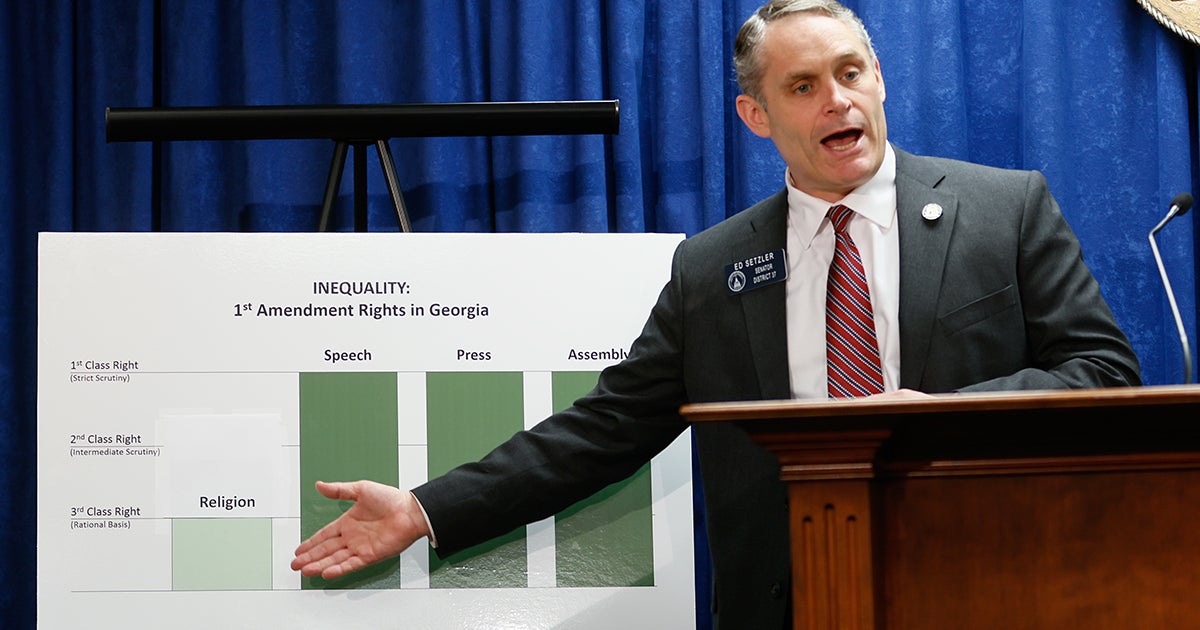
by Jorge Gomez • 5 min read
From federal agencies to state legislatures, we’re seeing a lot of positive actions for religious freedom. Here’s a rundown of recent policies, rules and legislation you should be aware of:
VA Includes Religious Accommodation Process in New ‘Reproductive Health Services’ Rule
New regulations from the U.S. Department of Veterans Affairs (VA) regarding “Reproductive Health Services” recognize a nationwide religious accommodation process for VA employees with religious objections to being forced to participate in abortions.
The VA implemented the process last year, only after Texas nurse practitioner Stephanie Carter sued the VA when it twice failed to accommodate her. First Liberty successfully represented Carter.
“We’re pleased that the VA will continue to recognize the nationwide religious accommodation policy it implemented after our client, Stephanie Carter, filed a lawsuit when she was twice denied a religious accommodation to not participate in abortion services because a process did not exist,” Senior Counsel Danielle Runyan said. “Every VA employee in the nation can now continue to seek a religious accommodation from participating in a procedure they find unconscionable.”
Ms. Carter has served veterans as a VA employee for more than 23 years. When she sought a religious accommodation from participating in abortions in the fall of 2022, VA officials informed her that no process for such accommodations existed. However, the VA created a religious accommodation process after Ms. Carter filed her lawsuit in December 2022.
Learn more:
Church Leaders: Biden Administration Finalizes Rule on Religious Liberty Protections
Utah Legislature Passes Bill Strengthening Religious Accommodations at Work
Both houses of the Utah Legislature recently passed HB 396, titled the “Workplace Discrimination Amendments.” It helps clarify what rights religious employees have and when they must be granted religious accommodations.
The legislation “prohibits an employer from compelling an employee to communicate or otherwise act in a manner that the employee believes would burden or offend the employee’s sincerely held religious beliefs.” It also creates “a process for an employer to accommodate an employee’s religious liberties.”
This bill comes as a result of First Liberty’s victory in our Faithful Carrier case, Groff v. DeJoy, which set a major precedent strengthening protections for religious Americans at work.
That unanimous landmark ruling held that employers cannot deny religious accommodations unless they can prove that accommodating their employees would “result in substantial increased costs in relation to the conduct of its particular business.” This caused a shift in the law in a way that favors religious employees.
It’s encouraging to see states like Utah taking steps to ensure their laws are consistent with the Supreme Court’s direction.
HB 396 will now head to Gov. Spencer Cox’s desk. If signed into law, it would take effect May 1.
‘Religious Freedom Restoration Act’ Advances in Georgia
The Georgia Senate recently passed Senate Bill 180, the Georgia Religious Freedom Restoration Act.
The bill strengthens religious freedom protections by limiting the ability of local and state governments to enforce or pass laws that conflict with religious beliefs. The language mirrors that of the federal Religious Freedom Restoration Act, one of the most important laws protecting religious liberty.
At least 24 states have their own RFRAs with varying degrees of protection. Some states have looser and broader RFRAs, while others have statutes or even constitutional provisions that offer much stronger religious liberty safeguards.
Georgia ranks 25th when it comes to protecting religious liberty, according to the 2023 Religious Liberty in the States Index—published by First Liberty’s Center for Religion Culture & Democracy. Having a RFRA is a key measure of how well a state protects religious freedom.
Learn More:
First Liberty: Which States are Advancing Bills to Help Protect Religious Freedom?
Center for Religion, Culture & Democracy: 2023 Religious Liberty in the States Index
Tennessee Bill Would Prohibit Religious Discrimination in Banking
Tennessee lawmakers are considering two bills – HB 2100 and SB 2148 – that would help protect consumers from religious discrimination.
The legislation would block financial institutions and insurance companies from denying or canceling services to people based on a person’s speech, opinions and affiliations, as well as a person’s religious beliefs and affiliations.
The proposal comes as cancel culture wreaks havoc on religious people in the marketplace. Banks in recent years apparently have closed some customers’ accounts based on their religious views.
Last fall, Indigenous Advanced Ministries, a faith-based nonprofit that holds traditional biblical values, claimed it was ‘debanked’ by Bank of America over its religious beliefs.
In 2022, First Liberty also reported when Chase Bank abruptly closed the bank account of the National Committee for Religious Freedom, a faith-based nonprofit organization led by Sam Brownback, former U.S. Ambassador-At-Large for Religious Freedom.
Similar measures to protect Americans from financial discrimination have been proposed this year in Florida and Iowa.
Learn More:
The Daily Wire: Religious Liberty Advocates Warn Tennessee Lawmakers About Dangers Of Politically Motivated ‘De-Banking’